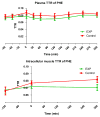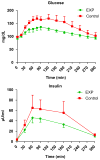Muscle protein synthesis in cancer patients can be stimulated with a specially formulated medical food
- PMID: 21683485
- PMCID: PMC3964623
- DOI: 10.1016/j.clnu.2011.05.008
Muscle protein synthesis in cancer patients can be stimulated with a specially formulated medical food
Abstract
Objective: Maintenance of muscle mass is crucial to improving outcome and quality of life in cancer patients. Stimulating muscle protein synthesis is the metabolic basis for maintaining muscle mass, but in cancer patients normal dietary intake has minimal effects on muscle protein synthesis. Adding leucine to high protein supplements stimulates muscle protein synthesis in healthy older subjects. The objective was to determine if a specially formulated medical food, high in leucine and protein, stimulates muscle protein synthesis acutely in individuals with cancer to a greater extent than a conventional medical food.
Design: A randomized, controlled, double-blind, parallel-group design was used in 25 patients with radiographic evidence of cancer. Patients were studied before their cancer treatment was started or 4 weeks after their treatment was completed or halted. The fractional rate of muscle protein synthesis (FSR) was measured using the tracer incorporation technique with L-[ring-(13)C(6)]-phenylalanine. The experimental group (n = 13) received a medical food containing 40 g protein, based on casein and whey protein and enriched with 10% free leucine and other specific components, while the control group (n = 12) was given a conventionally used medical food based on casein protein alone (24 g). Blood and muscle samples were collected in the basal state and 5h hours after ingestion of the medical foods.
Results: The cancer patients were in an inflammatory state, as reflected by high levels of C-reactive protein (CRP), IL-1 β and TNF-α, but were not insulin resistant (HOMA). After ingestion of the experimental medical food, plasma leucine increased to about 400 μM as compared to the peak value of 200 μM, after the control medical food (p < 0.001). Ingestion of the experimental medical food increased muscle protein FSR from 0.073 (SD: 0.023) to 0.097 (SD: 0.033) %/h (p = 0.0269). In contrast, ingestion of the control medical food did not increase muscle FSR; 0.073 (SD: 0.022) and 0.065 (SD: 0.028) %/h.
Conclusions: In cancer patients, conventional nutritional supplementation is ineffective in stimulating muscle protein synthesis. This anabolic resistance can be overcome with a specially formulated nutritional supplement.
2011 Elsevier Ltd and European Society for Clinical Nutrition and Metabolism. All rights reserved.
Conflict of interest statement
Dr. Wolfe is a member of the Danone Research Advisory Board and received compensation. Mr. Memelink and Dr. van Helvoort are employed by Nutricia Advanced Medical Nutrition, Danone Research – Centre for Specialised Nutrition. Dr. Ferrando, Dr. Deutz, Mr. Schutzler and Mr. Spencer have no conflict of interest to declare.
Figures





References
-
- Evans WJ, Morley JE, Argiles J, Bales C, Baracos V, Guttridge D, et al. Cachexia: a new definition. Clin Nutr. 2008;27(6):793–9. - PubMed
-
- Tisdale MJ. Mechanisms of cancer cachexia. Physiol Rev. 2009;89(2):381–410. - PubMed
-
- Biolo G, Antonione R, Barazzoni R, Zanetti M, Guarnieri G. Mechanisms of altered protein turnover in chronic diseases: a review of human kinetic studies. Curr Opin Clin Nutr Metab Care. 2003;6(1):55–63. - PubMed
-
- Shaw JH, Humberstone DA, Douglas RG, Koea J. Leucine kinetics in patients with benign disease, non-weight-losing cancer, and cancer cachexia: studies at the whole-body and tissue level and the response to nutritional support. Surgery. 1991;109(1):37–50. - PubMed
-
- De Blaauw I, Deutz NE, Von Meyenfeldt MF. Metabolic changes in cancer cachexia - first of two parts. Clin Nutr. 1997;16(4):169–76. - PubMed
Publication types
MeSH terms
Substances
Grants and funding
LinkOut - more resources
Full Text Sources
Other Literature Sources
Research Materials
Miscellaneous

